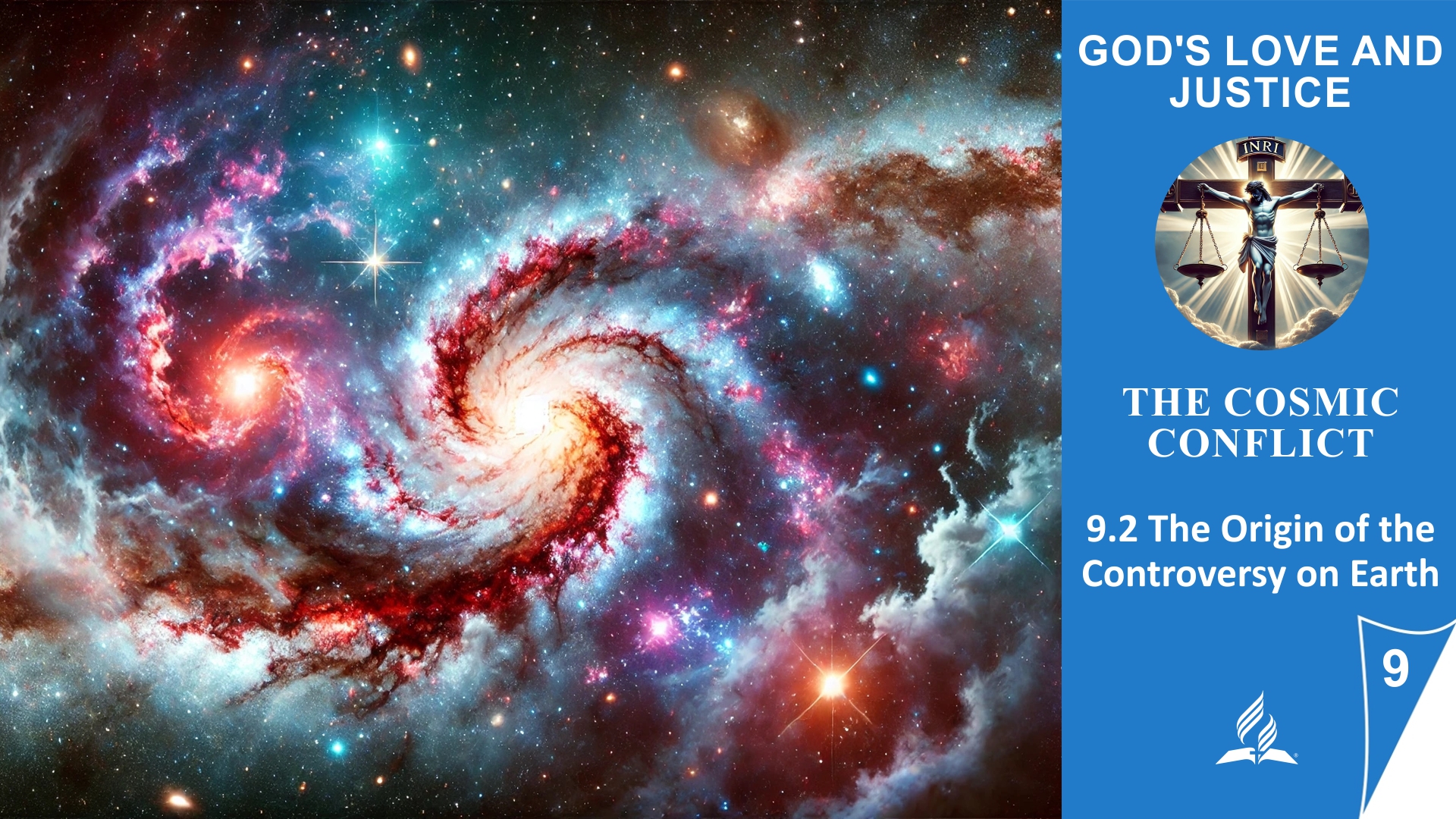


9.2 The Origin of the Controversy on Earth
The Origin of Evil – A Conflict Over Trust and Truth
Read Genesis 1:31. What do God’s words reveal about the state of creation when God had finished His work, and why is this answer important?
The question of the origin of evil has long occupied humanity. If God created everything “very good” (Genesis 1:31), how then could evil enter the world?
The verse emphasizes that God’s creation was originally perfect, harmonious, and free from suffering. Everything God made reflected His goodness, love, and perfection. This understanding is important because it shows that God is not the author of evil.
Evil did not arise from God’s creation but through the abuse of free will. God gave both angels and humans the freedom to choose—without this freedom, love would not be genuine. Satan, originally a perfect angel (cf. Ezekiel 28:15), chose to rebel against God out of pride and selfishness. Later, he seduced Adam and Eve, so that sin also entered human experience (Genesis 3).
Thus, evil did not come from God, but through rebellion against God’s good order. This insight is important because it makes clear that God is not responsible for suffering and sin. Rather, He respects the decisions of His creatures, even when they have tragic consequences. At the same time, the Bible shows that God has been working since the fall of man to overcome evil and redeem His creation.
Closing Thought:
God’s original creation was “very good.” Evil entered not through Him, but through the free will of His creatures. Yet God does not leave us in chaos—His plan of salvation through Jesus Christ reveals His love and His goal to restore all things. In the midst of evil, we may therefore have hope and trust in God’s ultimate victory.
Read Genesis 3:1–7. What does this tell us about how evil came to the earth? What light does this shed on the nature of the cosmic conflict? (See also Revelation 12:7–9)
The account in Genesis 3:1–7 describes how evil came to the earth: through deception, doubt, and mistrust of God. The serpent—in Revelation 12:7–9 identified as the devil—challenges God’s command and deliberately twists it. By asking, “Did God really say …?” it sows doubt about God’s goodness and truth. Then it directly contradicts God’s warning with the lie: “You will not surely die” (Genesis 3:4). The core of this temptation was to question God’s character, His integrity, and His loving intentions.
Eve was faced with a choice: should she believe God or the serpent? This moment reveals the essence of the cosmic conflict—it is a matter of trust and faith. Love is based on trust. When that trust is shaken, as the serpent achieved with Eve, the relationship breaks. Satan knew this and attacked precisely at the heart of the relationship between humanity and God.
The cosmic conflict, also mentioned in Revelation 12, began in heaven when Satan rebelled against God. On earth, this conflict continued in the Garden of Eden. It is a battle for loyalty and truth—not merely a physical struggle, but a spiritual conflict that affects the hearts and decisions of all creatures.
What Does This Mean for Us?
Even today, the same question arises: Whom do we believe? In a world full of voices, opinions, and temptations, God calls us to trust Him—even when Satan’s lies often appear tempting. The cosmic conflict unfolds in our daily lives when we must decide whether to trust God’s Word or follow seemingly easier alternatives.
Closing Thought:
Evil entered the world because trust in God was undermined by lies. The cosmic conflict still revolves around this central question: Do you trust God? If we hold fast to God’s love and truth, we stand on the side of the victor in this spiritual battle.
Read Genesis 3:15. God’s statement to the serpent—that the seed of the woman (referring to the Messiah) would crush the serpent’s head—is often called the first gospel (Protoevangelium) in Scripture. In what way does this underline the reality of the conflict and simultaneously give us hope amidst it?
Genesis 3:15 is a key moment in the Bible and is known as the Protoevangelium (first gospel) because it contains the first promise of redemption and victory over evil. After Adam and Eve sinned, God not only pronounced judgment but also announced His plan of salvation:
“And I will put enmity between you and the woman, and between your offspring and hers; he will crush your head, and you will strike his heel.”
-
The Reality of the Cosmic Conflict
This verse makes clear that there is a profound conflict between good and evil—between the seed of the woman (ultimately Jesus Christ) and the seed of the serpent (Satan and his followers). This battle is not only between God and Satan but concerns all of humanity. Since the fall, the world has been a stage for this conflict, which manifests in temptations, moral decisions, and the resistance against evil.
-
Hope Amidst the Conflict
Despite the bleak situation after the fall, God immediately offers hope: the descendant of the woman will defeat Satan. The imagery of crushing the head signifies a complete, final victory. Although the seed of the woman is wounded at the heel (an allusion to Jesus’ suffering and crucifixion), Jesus’ death and resurrection bring about the decisive triumph over sin and the devil.
This promise gives us hope because:
• Victory is assured: Satan may achieve temporary wins in history, but his ultimate fate is sealed.
• God’s rescue plan was active from the beginning: Even before the full consequences of sin were evident, God promised redemption.
• We are not alone in the battle: Jesus interceded for us and fights alongside us. His victory is also ours when we trust Him.
-
Relevance for Our Lives Today
This verse reminds us that we are in the midst of a spiritual conflict. Temptations and challenges are part of this struggle. Yet instead of despairing, we can look to Jesus, who has already defeated the enemy. Even when we experience “heel wounds”—setbacks, suffering, or trials—we know that God’s final victory is assured.
Closing Thought:
Genesis 3:15 reveals the reality of the cosmic conflict, but it emphasizes even more God’s love and hope for us. In Jesus Christ, the enemy is defeated, and we can stand with confidence in this spiritual battle, knowing that evil does not have the final word—God’s victory is certain!
The origin of evil and the cosmic conflict between good and evil are not merely theological concepts; they affect our daily lives and our faith in very personal ways. Here are some connections to our everyday life:
-
Trusting God’s Word in Daily Life
Genesis 3 shows that evil entered the world through doubt in God’s Word. Today, we face decisions daily that challenge our trust in God.
Practical: When we are in difficult situations (e.g., financial worries, illness, or relationship problems), the question arises: Do we trust that God has a plan? Or do we seek quicker, but not always right, solutions?
• Faith: God’s Word encourages us to trust Him even when circumstances suggest otherwise. Like Eve, we are faced with the choice: do we believe God or the voices of the world that question His truth?
-
The Battle Between Good and Evil in Our Decisions
The cosmic conflict is not only a heavenly reality; it also plays out in our hearts. Every day brings decisions where we must choose between selfishness and neighborly love, truth and falsehood, hope and despair.
Everyday Example: Do I steal for personal gain, or do I trust that honesty will eventually be rewarded?
• Faith Aspect: When we choose what is good, even when it is difficult, we demonstrate our loyalty to God.
-
Hope Amidst Suffering and Injustice
Often we ask: “Why is there so much suffering?” The biblical account explains that evil arose through the abuse of free will—not by God’s will. At the same time, Genesis 3:15 gives us hope: God had a plan for redemption from the very beginning.
In Daily Life: When we experience pain or injustice, we can know that evil will not prevail. Jesus has already achieved the decisive victory.
• Faith: This hope helps us endure difficult times, knowing that God will ultimately restore all things.
-
Awareness of Spiritual Reality
It is easy to overlook the spiritual battle and assume that decisions are purely rational or worldly. But the Bible makes it clear: behind temptations and moral challenges lies a spiritual reality.
In Daily Life: Feelings such as pride, envy, anger, or temptation are not merely “normal emotions”—they are part of a larger conflict for our hearts.
• Faith: By consciously asking God for help and holding fast to His Word, we can resist temptation.
-
An Invitation to a Relationship with God
The origin of evil began with a breach of trust. God’s plan of salvation is aimed at healing that broken relationship.
In Daily Life: God calls us not only to obedience but to a personal relationship. As in any relationship, trust is key.
• Faith: Through prayer, Bible study, and fellowship with other believers, we can strengthen that trust.
Closing Thought:
The origin of evil may be a grand topic, but its effects are tangible in our everyday lives. Every day we face decisions that reflect our loyalty to God. Yet we are not alone: Jesus has won the decisive victory, and through Him, we can stand firm in this spiritual battle. Trust, hope, and obedience to God provide us with guidance and peace—in the midst of a broken world.
👉 Everyday Question: Where in my life am I challenged to trust God more? How can I make a decision today that shows my loyalty to Him?

Trust God even when the way is unclear—His plan always leads to good.
(Visited 38 times, 1 visits today)






















